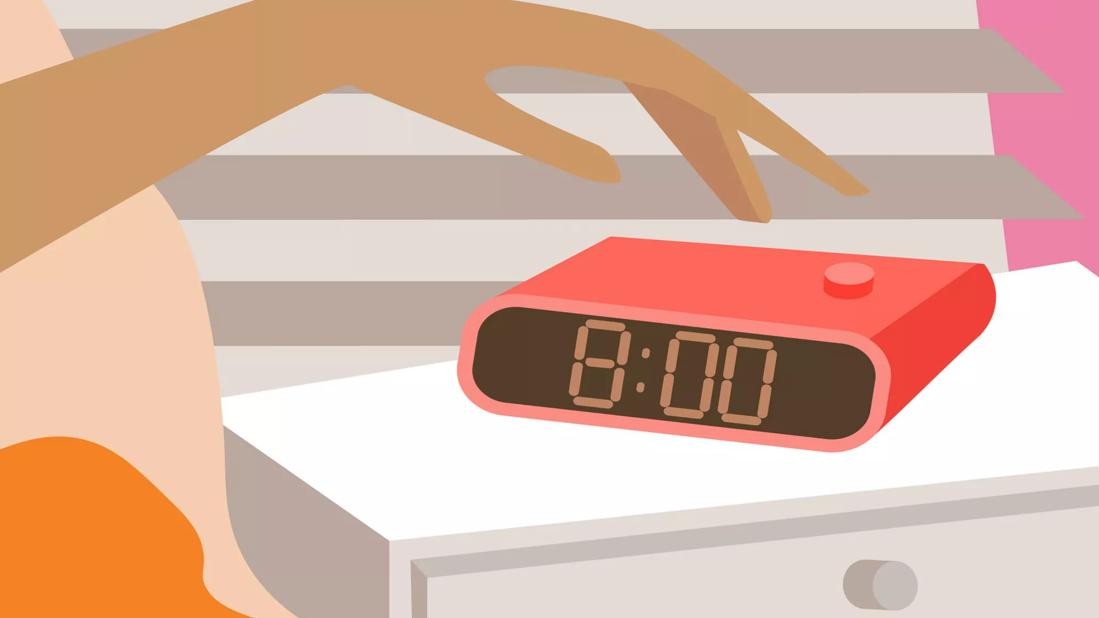It’s normal to oversleep occasionally, but sometimes, there might be an underlying cause

Image content: This image is available to view online.
View image online (https://assets.clevelandclinic.org/transform/b4a0d98b-e617-47b4-a92e-60f9fb3ac96b/Over-Sleeping-1363830362-770x533-1-scaled_jpg)
someone reaching toward alarm clock to turn off from bed
We’ve all been there: You’re getting over the flu … or launching a rigorous workout routine … or recovering from a nasty surgery. Or you simply had a long, hard, crummy week. And now you. Just. Can’t. Get out of bed.
Advertisement
Cleveland Clinic is a non-profit academic medical center. Advertising on our site helps support our mission. We do not endorse non-Cleveland Clinic products or services. Policy
If you’re worried about what’s going on with you, take heart — sleep specialist Michelle Drerup, PsyD, DBSM, has some good news.
“Sometimes, your body just needs a little bit of extra recovery time,” Dr. Drerup says. “Any kind of injury or illness, or even a work schedule that prevents you from getting enough sleep can cause you to sometimes sleep longer than usual. It’s generally nothing to worry about.”
On the other hand, sometimes oversleeping really is something to be concerned about. Dr. Drerup walks us through the distinctions.
According to the U.S. Centers for Disease Control and Prevention (CDC), adults generally need between seven and nine hours of sleep each night. For teens, ages 13 to 18, the sleep requirement is a little longer: The CDC recommends between eight and 10 hours a night.
But there’s room for individual variation within these estimates. We all know people who feel just fine after six hours of sleep. And there are also those folks (officially known as “long sleepers”) who make a habit of hitting the hay at 9 p.m. so they can wake up bright-eyed and bushy-tailed at 7 a.m. Whatever works for you is probably A-OK.
Unless your sleep habits are impacting your daily functioning, says Dr. Drerup. That could mean you’re having problems getting to work, attending classes, making it to appointments and keeping up with the routine demands of daily living, like eating, maintaining personal hygiene, paying bills and caring for children or other dependents. At that point, it’s reasonable to be concerned.
Advertisement
In most cases, people who oversleep (hypersomnia) are getting nine or more hours of sleep a night, for weeks at a time, and are still waking up feeling tired and out of sorts. “A common experience with oversleeping,” notes Dr. Drerup, “is that the more you sleep, the worse you feel.”
Here are some other possible signs of oversleeping:
If these behaviors continue for more than six to eight weeks, consider talking to a healthcare provider.
Routinely oversleeping is a symptom of an underlying disorder, not a disorder in and of itself. So, determining the underlying cause is an important part of getting effective treatment.
According to Dr. Drerup, two disorders are major culprits:
Fortunately, sleep apnea is relatively easy to diagnose and manage with the help of a healthcare provider or sleep specialist.
As many as 15% of people with depression experience oversleeping. Fortunately, depression can be diagnosed and treated. With effective treatment, symptoms, including oversleeping, can usually be managed.
Other conditions sometimes associated with oversleeping include:
It can be hard sometimes to tell which is cause and which is effect, notes Dr. Drerup. “Most associations tend to be bi-directional, meaning the effects can go both ways. For instance, depression can cause oversleeping, and oversleeping can worsen depression. Or chronic pain can cause oversleeping, but staying in bed too long can worsen chronic pain.”
Advertisement
Because proper treatment for oversleeping depends on knowing the cause, your first stop should be a family doctor or primary care provider, advises Dr. Drerup.
“If you report that you’re snoring and waking up gasping for air, your healthcare provider will want to rule out sleep apnea,” she says. “Or if you report you simply don’t feel like you can get out of bed, as you don’t want to face the day or have nothing to look forward to, they might suggest being screened for depression.”
Your healthcare provider might also refer you to a sleep medicine clinic for further evaluation. In that case, here’s what you might expect:
In the meantime, Dr. Drerup says there are several steps you can take to manage your symptoms at home:
Advertisement
Advertisement

Sign up for our Health Essentials emails for expert guidance on nutrition, fitness, sleep, skin care and more.
Learn more about our editorial process.
Advertisement
Pain, light exposure and anxiety are just a few factors that could be waking you up in the middle of the night
Stress, alcohol, sleep apnea and (you guessed it!) scary movies are a few common causes of bad dreams
Tame racing thoughts with breathing exercises, screen time limits and connecting to your body
How this common sleep problem causes confusion and strange behavior upon waking
Signs, causes and ways to address this problem
Tips for readjusting your sleep cycle
Sleep masks can help you create total darkness so you can sleep better
To avoid sleep deprivation and shift work sleep disorder, try adopting habits that minimize light exposure and prioritize daytime sleep
Although it could be used as a moisturizer, this new trend is not recommended
Communicating clear limits helps protect your time, energy and emotional well-being
High cholesterol can be genetic, but testing and treatment can lower your heart disease risk